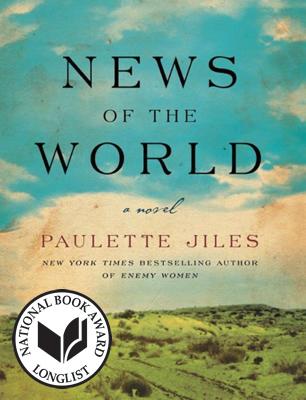News of the World
Set in a lawless Texas about five years after the end of the Civil War, News of the World by Paulette Jiles is the compelling and beautifully written account of a 400-mile journey reluctantly undertaken by Captain Jefferson Kyle Kidd. The purpose of the journey is to return a recently rescued child to her aunt and uncle. Ten-year old Johanna Leonberger had been captured three years ago by the same Kiowa Indian tribe which brutally murdered her parents and younger sister.
However, Johanna doesn’t want to be returned anywhere but back to her Kiowa family, the only one she’s known for four years. She’s forgotten the English language and speaks only Kiowa. She knows nothing of “civilized” behavior, including how to use a knife and fork. Irritated by the restrictive clothes she’s given, she flat-out refuses to wear the shoes provided for her.
For his part, Captain Kidd, at 72, would much prefer to stick to his routine of riding from one North Texas town to the next, reading the news to people for a dime a head. News is hard to come by in the hardscrabble west, and people are hungry for it, so the Captain obliges by reading selections from newspapers like the Boston Morning Journal, the New-York Tribune, or the Philadelphia Inquirer; whatever he can get from news shops in the bigger towns he visits.
At one of his readings, he runs into an acquaintance, a free black man named Britt Johnson. It’s Britt who asks the Captain to transport Johanna because he himself can’t safely transport a white girl, returned captive or not, on a 400-mile-long journey. So, despite strong reservations, the Captain, a man of honor, duty and integrity, agrees to undertake the dangerous three-week-long trek to return the defiant Johanna to her relatives.
As expected the two encounter very real dangers along the road. Yet they also slowly forge a bond of trust and affection, which grows as they come to rely on each other for their very survival in the harsh landscape. This growing affection will force the Captain to face a horrible choice as their journey, and his ostensible obligation to Johanna, comes to an end.
I highly recommend this book for anyone who enjoys historical fiction, westerns, or just an incredibly well-told story. One word of caution, Jiles does not use standard punctuation to indicate when a character is speaking. However, after two pages, I no longer noticed this quirk, and it actually allowed the narrative to flow quite nicely.
